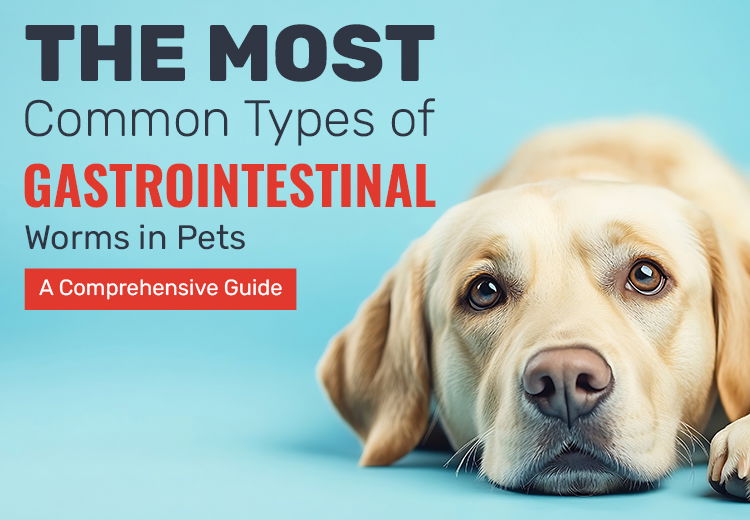-
Popular Brands View All BrandsPopular Brands View All BrandsPopular Brands View All BrandsPopular Brands View All BrandsPopular Brands View All Brands
- Dogs
- Cats
- Brands
- New Arrivals
- Below R150
- Refer & Save More
- Christmas Sale
Nov 30, 2024

As dog parents, we want to protect our canine companions from all the possible problems including parasites. Intestinal worms are one such parasite that can be harmful and have the potential to cause severe health issues if left untreated.
In this blog, we will explore different types of worms that affect dogs, their symptoms, and how we can prevent them.
Let’s get started!
Let's have a look at some of the common types of gastrointestinal worms to infect pets:
Roundworms
Roundworms are long, tube-shaped parasites that live in a dog’s intestines. They are often found in puppies, as they can be passed from the mother from before birth or while nursing. Adult dogs can get infected with roundworms by ingesting worm eggs from contaminated soil or objects or by eating infected rodents.
Once inside the dog's small intestine, worm eggs or larvae develop into adult worms. These adult worms lay eggs that excrete in the dog's feces, contaminating the surrounding environment. The eggs then mature in the soil, where they can be ingested again by the dog or other animals, such as rodents, thus continuing the cycle.
Symptoms of Roundworms
Here are the signs of roundworms in pets:
Tapeworms
Tapeworms are flat, segmented worms that can attach to a dog’s intestines. You may see small rice-like segments around your dog’s anus or in their stool if they are infected with tapeworms. Dogs usually get tapeworms by swallowing fleas or rodents that carry worm larvae.
Tapeworms require fleas as intermediate hosts. The cycle begins when a dog or cat ingests an infected flea during grooming. The eggs inside the flea larvae develop into cysticercoid larvae, which are then consumed by the host. The larvae mature into adult tapeworms in the intestines, and proglottids (segments containing eggs) are passed out through the feces. These proglottids can also infect other animals or humans, continuing the cycle.
Symptoms of Tapeworms
Take look at the signs of tapeworms in pets:
Hookworms
Hookworms are tiny worms that attach to the walls of a dog’s intestines and suck blood. They can be spread when dogs ingest larvae from contaminated soil, or through direct contact with the infected pet’s skin. Puppies are especially at risk because they can get the infection from their mother's milk.
Once hookworms enter in the pet’s body, they travel through the bloodstream to the lungs or small intestine. After maturing into adult worms, they can cause discomfort and substantial damage. Adult hookworms lay eggs in the intestines, which are then excreted in the feces, continuing the cycle when the eggs hatch into larvae.
Symptoms of Hookworms
Common signs of hookworms in pets include:
Whipworms
Whipworms are another type of intestinal parasite that causes infection in the colon and cecum. Dogs usually get whipworms by eating worm eggs left behind in contaminated environments, such as soil or water. Whipworm eggs can survive for a long time in the environment.
These worm eggs mature in the soil over 15-30 days. When a non-infected pet comes in contact with contaminated hands, foods, or soil, worm eggs are ingested. The eggs hatch in the small intestine, and the larvae mature into adult worms that settle in the large intestine. Female whipworms then lay eggs, which are excreted in the stool to repeat the cycle.
Symptoms of Whipworms
Here are the signs of whipworms in pets:
Prevention of Worms in Pets
Take a look at some preventive tips to keep intestinal worms at bay:
Closure
Worms are a major cause of health issues in pets, so it's important to ensure their well-being. The most common and harmful worms include roundworms, hookworms, tapeworms, and whipworms. By understanding these parasites and their symptoms, you can take timely action to treat your pet effectively and keep them healthy.
Nov 30, 2024
As dog parents, we want to protect our canine companions from all the possible problems including parasites. Intestinal worms are one such ...
Nov 13, 2024
It is time to welcome the holiday season. With Thanksgiving just around the corner, the preparations for the celebration have started in fu...